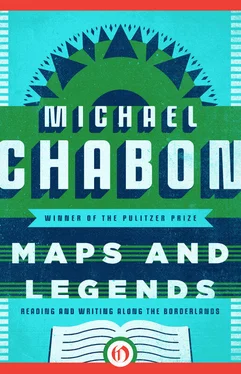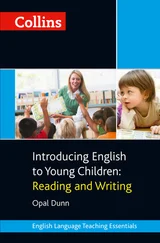The implications of this change on the official language of the “Jewish homeland,” a change which, depending on your view of human character and its underpinnings, was either minor or fundamental, were difficult to sort out. I couldn’t help thinking that such a nation, speaking its essentially European tongue, would, in the Middle East, stick out among its neighbors to an even greater degree than Israel does now. But would the Jews of a Mediterranean Yisroel be impugned and admired for having the same kind of character that Israelis, rightly or wrongly, are widely taken to have, the classic sabra personality: rude, scrappy, loud, tough, secular, hardheaded, cagey, pushy? Was it living in a near-permanent state of war, or was it the Hebrew language, or something else, that had made Israeli humor so dark, so barbed, so cynical, so untranslatable? Perhaps this Yìsroel, like its cognate in our own world, had the potential to seem a frightening, even a harrowing place, as the following sequence from the section on “Difficulties” seemed to imply:
109. What is the matter here?
110. What am I to do?
112. They are bothering me.
113. Go away.
114. I will call a policeman.
In an essay that I wrote and eventually published in Civilization magazine — and from which I am here liberally quoting — I tried to imagine one possible Yìsroel: the youngest nation on the North American continent, founded in the former Alaska Territory during World War II as a resettlement zone for the Jews of Europe. (For a brief while, I had once read, the Roosevelt administration had proposed such a plan.) The resulting country would be a far different place than Israel. It would be a cold, northern land of furs, paprika, samovars, and one long, glorious day of summer. It would be absurd to speak Hebrew, that tongue of spikenard and almonds, in such a place. This Yisroel — or maybe it would be called Alyeska — I imagined at the time as a kind of Jewish Sweden, social-democratic, resource rich, prosperous, organizationally and temperamentally far more akin to its immediate neighbor, Canada, than to its more freewheeling benefactor far to the south. Perhaps, indeed, there might have been some conflict, in the years since independence, between the United States and Alyeska.
This country I thought of was in the nature of a wistful fantasyland, a toy theater with miniature sets and furnishings to arrange and rearrange, painted backdrops on which the gleaming lineaments of a snowy Jewish Onhava could be glimpsed, all its grief concealed behind the scrim, hidden in the machinery of the loft, sealed up beneath trapdoors in the floorboards. But there was another destination to which the Weinreichs beckoned, unwittingly but in all the detail that Dover’s “Say It” series required: home, to the “old country.” To Europe.
In this Europe the millions of Jews who were never killed would have produced grandchildren, and great-grandchildren, and great-great-grandchildren. The countryside would retain large pockets of country people whose first language was still Yiddish, and in the cities one could find many more for whom Yiddish would be the language of kitchen and family, of theater and poetry and scholarship. A surprisingly large number of these people would be my relations. I would be able to go visit them, the way Irish Americans I knew were always visiting second and third cousins in Galway or Cork, sleeping in their strange beds, eating their strange food, and looking just like them. Imagine. Perhaps one of my cousins might take me to visit the house where my father’s mother was born, or to the school in Vilna that my grandfather’s grandfather attended with the boy Abraham Cahan. For my relatives, though they would doubtless know at least some English, I would want to trot out a few appropriate Yiddish phrases, more than anything as a way of reestablishing the tenuous connection between us; in this world Yiddish would not be, as it is in ours, a tin can with no tin can on the other end of the string. Here, though I would be able to get by without them, I would be glad to have the Weinreichs along. Who knows but that visiting some remote Polish backwater I might be compelled to visit a dentist to whom I would want to cry out, having found the appropriate number (1,447), “eer TOOT meer VAY!”
What would this Europe be like, I wondered, with its 25, 30, or 35 million Jews? Would they be tolerated, despised, ignored by, or merely indistinguishable from their fellow modern Europeans? What would the world be like, never having felt the need to create an Israel, that hard bit of grit in the socket that hinges Africa to Asia?
What, I wondered in the conclusion of my original essay, did it mean to originate from a place, from a world, from a culture that no longer existed, from a language that might die in my generation? What phrases would I need to know in order to speak to those millions of unborn phantoms to whom I belonged?
Just what was I supposed to do with this book?
5.
Not long after the essay on Say It in Yiddish was published in Civilization, I received a puckish email from my uncle Stan — the late Stanley Werbow, my grandmother’s brother, a noted scholar of German and an American-born native speaker of Yiddish — congratulating me on having accomplished the trick, never especially difficult, of outraging Yiddishists.
The offended parties belonged to an Internet listserv called Mendele, which provides an electronic forum for a freewheeling discussion — its tone ranging from academic to informal, from humorous to dry as dust — of Yiddish and Yiddish culture, and to which my uncle Stan was himself a subscriber.
The Yiddish language evolved over the course of the thousand years following the migration of Jews into Western Europe and up to 1939, at which date its literature ranked among the glories of world heritage. About half of its approximately 11 million speakers were murdered during the Holocaust, with the rest dispersed, assimilated into other languages, or passed on, without passing on Yiddish. It continues to be spoken today as a home language by a far smaller if indeterminate number of older people and ultraorthodox Jews, and as a second language by scholars, students, and those devotees, like many of the subscribers to Mendele, who have made learning and preserving it their passionate pastime.
It turned out, when I took Uncle Stan up on his tip, that some of the Mendelyaners, as the listserv’s members style themselves, were angry because of my essay, to which they had first been alerted by the following post:
Date: Mon, 23 Jun 1997
Subject: Weinreich’s phrase book
I should like to alert the readers of this list to a delightfully humorous essay regarding Uriel and Beatrice Weinreich’s little paperback phrase book Say It in Yiddish in the current (June — July 1997) issue of Civilization [The Magazine of The Library of Congress]. The essay is entitled “Guidebook to a Land of Ghosts” and is subtitled “A Yiddish phrase book is an absurd, poignant artifact of a country that never was.” The writer, Michael Chabon, finds, in the pages of the phrase book, detailed directions — buying plane tickets, visiting the dentist, getting a finger wave from a Yiddish-speaking hairdresser or a shoeshine from a Yiddish-speaking shineboy — in a country that never existed. The charming illustrations by Ben Katchor …
This initial post was followed two days later by:
Date: Wed, 25 Jun 1997
Subject: Weinreich’s phrase book
I have to take issue with the note … regarding an article in the magazine Civilization about the above book. I haven’t read the article (nor do I intend to, based on [the previous] review), but I find reference to Ashkenaz as “a country that never was” quite offensive and not “delightfully humorous” at all.…The author of this piece should be excoriated rather than praised for this article, and placed in the same kheyrem as the rest of those who think Yiddish is dead.
Читать дальше
Конец ознакомительного отрывка
Купить книгу












